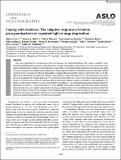Coping with darkness: The adaptive response of marine picocyanobacteria to repeated light energy deprivation
Author(s)
Coe, Allison; Biller, Steven J; Thomas, Elaina; Boulias, Konstantinos; Bliem, Christina; Arellano, Aldo; Dooley, Keven; Rasmussen, Anna N; LeGault, Kristen; O'Keefe, Tyler J; Stover, Sarah; Greer, Eric L; Chisholm, Sallie W; ... Show more Show less
DownloadPublished version (1.375Mb)
Publisher with Creative Commons License
Publisher with Creative Commons License
Creative Commons Attribution
Terms of use
Metadata
Show full item recordAbstract
The picocyanobacteria Prochlorococcus and Synechococcus are found throughout the ocean's euphotic zone, where the daily light:dark cycle drives their physiology. Periodic deep mixing events can, however, move cells below this region, depriving them of light for extended periods of time. Here, we demonstrate that members of these genera can adapt to tolerate repeated periods of light energy deprivation. Strains kept in the dark for 3 d and then returned to the light initially required 18–26 d to resume growth, but after multiple rounds of dark exposure they began to regrow after only 1–2 d. This dark-tolerant phenotype was stable and heritable; some cultures retained the trait for over 132 generations even when grown in a standard 13:11 light:dark cycle. We found no genetic differences between the dark-tolerant and parental strains of Prochlorococcus NATL2A, indicating that an epigenetic change is likely responsible for the adaptation. To begin to explore this possibility, we asked whether DNA methylation—one potential mechanism mediating epigenetic inheritance in bacteria—occurs in Prochlorococcus. LC–MS/MS analysis showed that while DNA methylations, including 6 mA and 5 mC, are found in some other Prochlorococcus strains, there were no methylations detected in either the parental or dark-tolerant NATL2A strains. These findings suggest that Prochlorococcus utilizes a yet-to-be-determined epigenetic mechanism to adapt to the stress of extended light energy deprivation, and highlights phenotypic heterogeneity as an additional dimension of Prochlorococcus diversity.
Date issued
2021-09Department
Massachusetts Institute of Technology. Department of Civil and Environmental Engineering; Massachusetts Institute of Technology. Department of BiologyJournal
Limnology and Oceanography
Publisher
Wiley
Citation
Coe, A., Biller, S.J., Thomas, E., Boulias, K., Bliem, C., Arellano, A., Dooley, K., Rasmussen, A.N., LeGault, K., O'Keefe, T.J., Stover, S., Greer, E.L. and Chisholm, S.W. (2021), Coping with darkness: The adaptive response of marine picocyanobacteria to repeated light energy deprivation. Limnol Oceanogr, 66: 3300-3312
Version: Final published version
ISSN
1939-5590